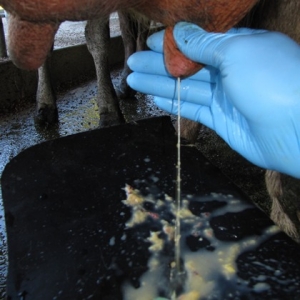However, a review of advertising practices is planned "to determine if additional guidance is needed or if the existing controls on advertising need to be changed for antibiotic veterinary medicines."
MPI says the report, Antibiotics Sales Analysis 2009-2011, found a 19% reduction in antibiotic use over the three years surveyed.
"We understand that this reduction is largely attributable to positive changes in production animal management in the pig, poultry and dairy industries," says MPI deputy director-general standards, Carol Barnao.
"These industries have reported a move towards non-antibiotic preventative treatments like vaccination and changes to on-farm practices to decrease their antibiotic use."
DairyNZ and the Dairy Companies Association of New Zealand (DCANZ) say the report highlights the importance of animal owners working with veterinarians to manage antibiotic use.
"Ensuring [antibiotics'] future effectiveness is in everyone's interest," says DCANZ executive office Kimberly Crewther.
"The dairy industry's position on antibiotic use is to use as little as possible without compromising animal welfare.... Prevention is the best approach.... This is especially the case for the key areas of lameness and mastitis."
DairyNZ chief scientist Dr Eric Hillerton says all dairy antibiotic treatments are recorded and records of use are independently audited annually by processors to manage milk quality risks and ensure only healthy animals contribute to milk supply.
"The national mastitis control programmes developed and implemented by DairyNZ and industry partners ensure the quality of milk supplied from farms is world leading," he says, noting New Zealand has only half the mastitis of the USA and a quarter of the UK incidence.
DairyNZ worked with the International Dairy Federation to produce a guide to prudent use of antimicrobial agents in dairy production and it is being customised for New Zealand, says Hillerton.
Crewther says the dairy industry is "committed to sensible and expedient use of antibiotics to safeguard animal health and welfare, and ensure a safe product for consumers."
MPI says considerable consultation with industry and selected individual veterinarians went into the report's compilation which is why it is two years out of date, says MPI. However, having established procedures for such a report the next one, covering 2011-2013, should be released June 2014. Thereafter, reports will be released annually.
Barnao says the 2009-11 analysis revealed areas needing further study, including increased use of injectable tylosin in cattle, third and fourth generation cephalosporins in production and companion animals, and reported marketing and choice of antibiotics based on convenience rather than most appropriate therapeutic choice.
"As a result of this information, MPI will gather further information and look at controls around the marketing and use of antibiotic products to determine they effectively manage risks associated with antibiotic resistance," says Barnao.
Tylosin use is important because it is in the class of antibiotics known as Macrolides, a class important to human medicine. A trend of increased use in cattle as a convenient once-daily treatment for mastitis needs investigating to ensure the potential risk of antibiotic resistance is limited, and it is the most appropriate treatment. It is critical to the management of certain infections not responsive to other antibiotics, says MPI.
Other convenience factors which could be compromising use and MPI intends to investigate include zero or short withholding periods, and "one shot dose" products.
New Zealand's use of antibiotics and resistance status was surveyed by MPI in a baseline study covering 2009-10. It found farm use to be responsible and in compliance with veterinarian advice, and what little resistance was found had no direct implications for human health. There did not appear to have been an increase in resistance since previous studies, and compared with 2009 data from Denmark resistance among bacteria from New Zealand pigs and poultry was either lower or not significantly different.
MPI says control of use of veterinary antibiotics in New Zealand meets international best practice but the latest report provides some opportunities to verify practices and further refine controls if needed.
The New Zealand Veterinary Association and industry groups such as NZ Pork and the Poultry Industry Association New Zealand (PIANZ) have published guidance for the prudent use of antibiotics within industry. Further guidance and updates from NZVA are in progress.
The MPI report is at http://www.mpi.govt.nz/Default.aspx?TabId=126&id=2121
A MINISTRY for Primary Industry report released today says veterinary and horticultural antibiotic use appears to be dropping.
Popular Reads
Fonterra confirms timeline for Lactalis deal and $2-per-share capital return
The sale of Fonterra’s global consumer and related businesses is expected to be completed within two months.Formula goes sour
OPINION: Media reports say global recalls tied to cereulide toxin contamination in milk-based nutrition brands could inflict combined financial losses…China’s new beef tariffs expected to favour New Zealand exporters
Additional tariffs introduced by the Chinese Government last month on beef imports should favour New Zealand farmers and exporters.Southland enters status 2 water shortage amid dry conditions
While the North Island is inundated with rain, Southland is facing receding water levels as warm weather and lack of rainfall…Featured
Northland Field Days patron reflects on event's rain-soaked beginnings
Northland Field Days patron Ross Newlove remembers the inaugural field days he attended 40 years ago.
Southland Farmer Murray Donald appointed chair of Safer Farms
Southland farmer Murray Donald has been appointed as chair of Safer Farms, the industry-led organisation focused on reducing harm, injuries and fatalities in the agricultural sector.
National Lamb Day Returns on February 15
National Lamb Day returns this Sunday, 15 February, with Beef + Lamb New Zealand Inc calling on Kiwis to fire up their barbecues and celebrate the people and the product that put New Zealand on the world map.
Northland Field Days sound system maestro marks 40 years on the job
When it comes to arranging the sound system at Northland Field Days, no one does it better than Colin Finlayson.
Northland Field Days promise unforgettable 40th anniversary Celebration
A 40th Anniversary event to remember.
Mountain Warrior's words of wisdom
The Mountain Warrior Shane Cameron is coming back to his roots as key note speaker at the East Coast Farming Expo Property Brokers Evening Muster in February.
National
Free entry for 40-year-olds at Northland Field Days
For forty-year-olds, there's no excuse to miss this year's Northland Field Days.Storm damage unlikely to dampen strong kiwifruit season, says growers’ body
While the recent storms in the upper and eastern part of the North Island have hit a few kiwifruit growers,…Super-premium wool contract delivers major boost for New Zealand growers
Keratin biomaterials company Keraplast and Wools of New Zealand have signed a new superpremium wool contract which is said to…NZ Red Meat Outlook 2026: Growth amid trade uncertainty
While things are looking positive for the red meat sector in 2026, volatility in global trade remains a concern, says…Massey University hosts conference on innovative catchment-level water solutions
The quest to find innovative practical, scientific solutions to deal with water-related issues at a catchment level has been the theme…Machinery & Products
NZ farm machinery market shows strong recovery with 10% lift in 2025
Coming in at a year-end total at 3088 units, a rise of around 10% over the 2806 total for 2024,…CF MOTO launches first electric UTV in NZ
With the rising interest in alternative fuels, it’s no surprise that manufacturers of ATVs and side-by-side vehicles are introducing alternative…RAM Trucks NZ tops large pickup sales for 10th year
RAM Trucks NZ continues to claim dominance, ending 2025 as the top-selling large pickup truck in NZ, its tenth consecutive…Norwood opens new Tasman dealership
Norwood has announced the opening of a new Tasman dealership at Richmond near Nelson next month.Erth Engineering launches PanBuster for effective grassland compaction relief
In Grassland, compaction starts at the surface and builds progressively deeper, causing poorer water transfer, more anaerobic activity and shallower rooting,…» Latest Print Issues Online
The Hound

Bulldust!
OPINION: Here w go: the election date is set for November 7 and the politicians are out of the gate…
No good news?
OPINION: ECan data was released a few days ago showing Canterbury farmers have made “giant strides on environmental performance”.
















